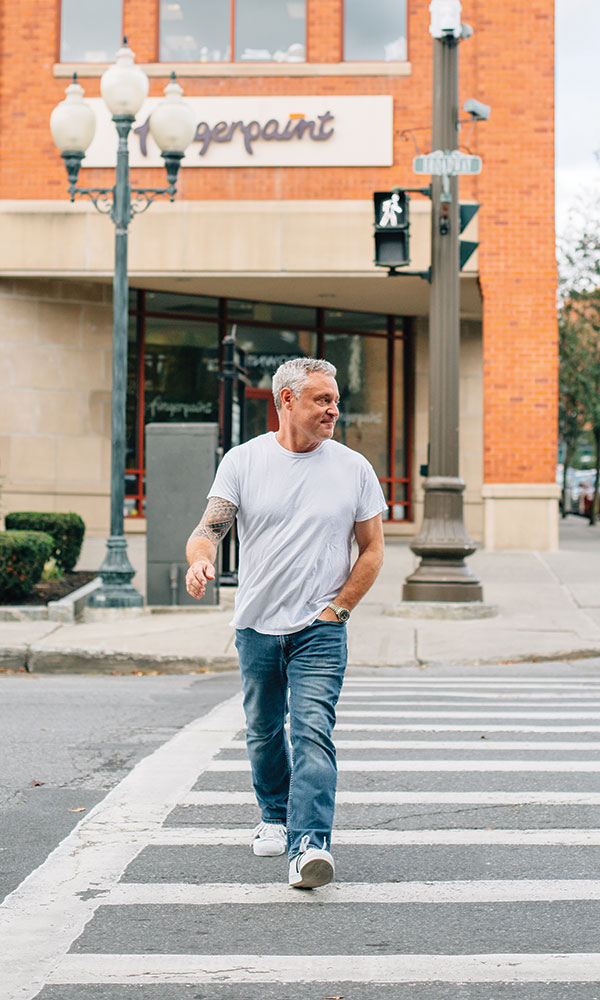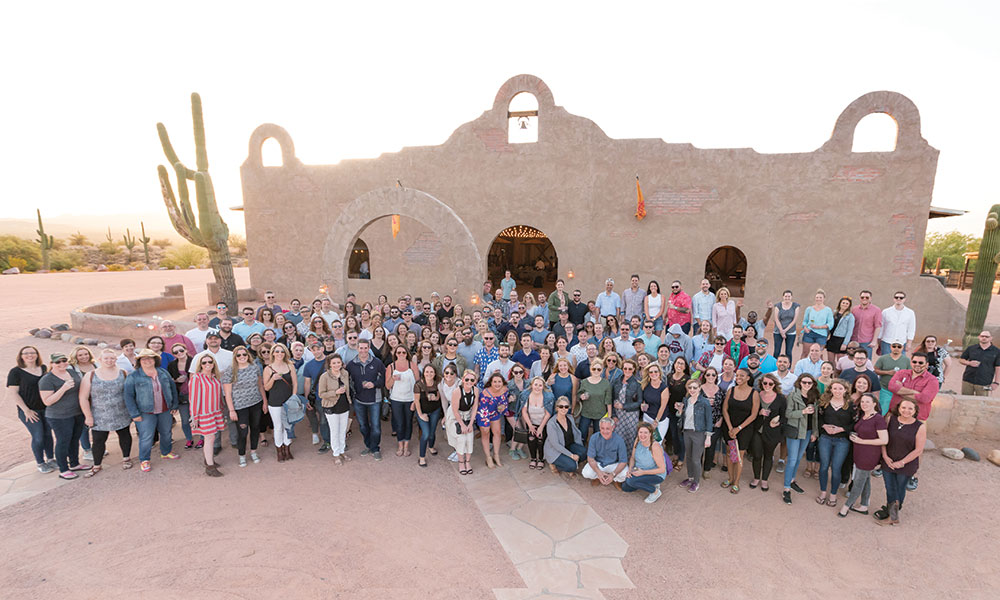Ed Mitzen calls Saratoga Springs his Mayberry. There’s certainly a bit of Andy Griffith about the guy—a studied guilelessness, an affability he wears like a badge—as he walks me the few blocks from his advertising company, Fingerpaint, to Boca Bistro, his favorite lunch spot on Broadway. By the time we’re seated, he’s shaken a few hands on the way over and waved at a couple of fellow diners. He orders his regular chicken sandwich and insists I try the dates stuffed with Valdeón blue cheese and Marcona almonds, which are then wrapped in bacon with a cider glaze.
“And would you like tap or mineral water?” the waitress asks me.
“I guess I should have Saratoga Spring Water,” I tell her as she rolls her eyes but dutifully goes to put in the order for the dates.
“I think she’s heard that before,” says Mitzen.
“I was doing it for your benefit, not hers,” I say. “I saw that Saratoga Spring Water is on your client list.”
“We’ve done some work for them,” he says, “although they’re much smaller than you’d think.”
“So are you,” I tell him, commenting on how compact he is, which makes him laugh at his own expense, this muscular motorcycle enthusiast with close-cropped, gun-metal hair. On a bicep is a newly inked tattoo inspired not only by an intricately reimagined King Kong and Mitzen’s recently having turned 50, but also his own equally intricate attempt to reimagine what turning 50 means.

Tattooed, talked-about Ed Mitzen might be a small guy, but he’s a big man. The Voorheesville native has been referred to as a serial entrepreneur, having built four marketing companies with total revenues of more than $200 million. Fingerpaint is his fourth, and is a full-service (though they dub it “right-service”) advertising agency with more than 200 employees and billing this year of $50 million, most of that in the pharmaceutical/health and wellness sector, which is the company’s specialty. Why Big Pharma? It doesn’t have the greatest of socially conscious reputations, even though Mitzen himself has developed one here in Saratoga. When one hears the term “Big Pharma,” one thinks “greed” and “profits over people,” which is ironic considering that Mitzen and his company are known for their people-first corporate philosophy. “I love science,” he says when explaining to me why he has purposefully found himself in a marketing league with Big Pharma. “I’ve always loved it. My dad was a biochemist. I’m sure a lot of it is about a lot of us wanting to make our fathers proud. My dad was a scientist and my mom is a retired nurse. I love that we work in the science industry. I think it’s really sad that the pharma industry has a worse reputation than the tobacco industry. There’s a lot of good being done by pharma. We will not promote products that are being slanted in an unethical matter, but if you’re asking if I feel compromised because we work in healthcare and I give money away so I can sleep at night, the answer is no. I’m very proud to work in the healthcare space.”
Fingerpaint recently bought its headquarters building on Broadway, adding to its real estate portfolio in town, which already included 1 Franklin Square, a two-story building built in 1836, which the company purchased last year as an off-site center for ideation and brainstorming and conceptualizing new ways to market its clients’ products. There are even four apartments at the 1 Franklin Square site to house employees if they need to stay overnight for work or weather reasons. Since its founding in 2008, Fingerpaint has created this kind of empathetic corporate culture for those who work there. From unlimited sick and personal time, to paid sabbaticals, to the agency’s paying 100 percent of healthcare premium costs for its employees and their dependents, it’s a culture that mirrors Mitzen’s own values and for which he was named Boss of the Year in 2017 by Digiday, the online magazine that covers the fields of advertising, publishing and media. “I have an undying appreciation for how hard my employees work,” he says. “I’ve never laid anybody off. I’ve been in the ad business for 20 years, and I’m very proud of that. If we lose a client for some reason, I’d rather lose money for six months than fire these people. I think the town looks at our company as really good for the community, too. This past summer, we put together a program where we made 65,000 lunches for kids who needed lunches when they’re not in school.”
When he was attending school himself back in Voorheesville, Mitzen, who’s a big Boston Red Sox fan and longs for the day he can take his first grandchild to Fenway Park, didn’t want to play baseball but football. He was both a star running back at Clayton A. Bouton High School and his team’s kicker. Syracuse University, in fact, asked him to come try out to be a kicker on its varsity team, but Mitzen didn’t think the job was big enough. He liked running the ball. “I thought: “A kicker? I’m not going to do that.” So I didn’t go and try out. To this day, it’s one of my biggest regrets, that I didn’t go and at least try. Who knows? I could have been in the NFL as a kicker.”

His dream of being another Adam Vinatieri wasn’t the only one that didn’t materialize. He also wanted to be a doctor, but when his dad died of a heart attack when Mitzen was 18, he went through a dark period while attending Syracuse. He knew his grades weren’t good enough to get him into medical school, so he got a job as a drug rep after graduation and moved to Columbus. He even went back to business school because, during all his time at Syracuse, he’d never taken a business course. But Mitzen found himself at 30 with two young kids and feeling quite conflicted. “I had reached that point in my life that, if I were at work, I felt like a shitty dad, and if I were home, I thought I was never going to get my career going. I was miserable. I came home one day on a Friday after a 70-hour work week—we’ve all had them—and my then wife asked me to watch our son. He was about one at the time. I was sitting on the bed watching ESPN and zoning out. My son rolled off the bed and fell. My wife came running into the bedroom ready to tear me a new one. My eyes filled up with water. I thought: ‘Screw it. I have to quit.’ So I did, and started a marketing consulting business. That grew. I had about 13 guys who worked for me. The clients were asking us to do advertising. I was a dimwit. I thought, ‘It’s just words and pictures. It can’t be that hard.’ I knew that most of the advertising I saw in the healthcare space was shit. I still think that. You look at ads on TV, and they all look the same. There’s a lot of motion in the background to distract you as they tell you that your liver might fall out if you take this drug.”
So Mitzen packed up his family and moved back to Upstate New York in 1997, settling in Saratoga. “The first time I came to Saratoga I was still in high school,” he tells me. “I’d come for concerts at the Saratoga Performing Arts Center. I saw the Grateful Dead, the Doobie Brothers, Springsteen. You could sit on the lawn for $10 and hang with your buddies. In college, I’d go to the racetrack as a fun, social thing to do. It was a lot different back then. It wasn’t nearly as built up as it is now. Our building now at Fingerpaint was a dilapidated pizza shop back then. The whole town has really blossomed.”
So has Mitzen since moving back here, but not without a few withering reassessments along the way about his life after he sold his advertising/consulting company in 2006. “I was also going through a divorce. I needed a fresh start. I was at a turning point in my life. I was 35. I had never had money before. I had never had success. I think I got a little full of myself. I just wasn’t doing well. I had to get my shit together. So I started Fingerpaint in a tiny office with a card table. It was sort of a mulligan for me. I had to take all the bad habits I had and throw them out the window. I said to myself, ‘This isn’t you.’”
And then he met Lisa.
“I immediately fell in love. I wasn’t planning to get married again. We’ve been together for 13 years.” Had she been married before as well? “She got married when she was around 23 to the guy in the band, and then he cut his hair. Lisa was great for me. She kept me grounded. She also helped me start Fingerpaint. The economy had tanked. Any stock I had had evaporated. My 401(k) was gone and that was what I was using to fund the business for cash flow. I had just paid this massive amount of money for a divorce. I was back to square one. I was thinking, ‘What the hell had I done?’ I was living in an apartment with a couch and a flat-screen TV and that was about it. Oh, I had a beanbag chair. I had that. Lisa—who worked for Countrywide at the time and hated it—actually lent me some money to help get the business off the ground.”

Lisa now teaches fitness classes at Saratoga Bootcamp Bike & Box Studio and is quite involved in the couple’s philanthropic efforts when not managing the 40-acre farm where they live, about ten minutes outside Saratoga. “Two years ago, we were out at the farm for Christmas Eve dinner, just the two of us,” says Mitzen. “Lisa makes this big Italian thing. I don’t see my kids on Christmas Eve. I have them on Christmas day. [Mitzen has three children: Emily, in Manhattan; Nick, in Brooklyn; and Grace, a recent graduate of The Emma Willard School in Troy, who’s enrolled at UC-Santa Cruz.] So Lisa and I were sitting at home, and we thought, ‘Let’s go to the shelter and work.’ We came home from doing it that first time. I poured myself a big bourbon. She poured herself a glass of wine. And she said, ‘Our dogs live better than those people do.’ It really hit us both: We just have to do something. This is ridiculous. So we pledged $1 million to the charity involved in running the shelter to build a permanent one.”
It was in that moment that Mitzen’s advocacy for Code Blue Saratoga began. Code Blue, a program of Shelters Of Saratoga, is an emergency homeless shelter open from November until April when the temperature dips below 32 degrees or a snowfall of 12 inches or more is predicted. All individuals seeking shelter are accepted without restrictions. The shelter’s temporary location is at Soul Saving Station Church at 62 Henry Street. “It’s nice that the church lets them stay there, but there’s no men’s and women’s sleeping quarters,” says Mitzen. “There are no laundry facilities. There’s not a lot of room to store a lot of food. There’s one bathroom for 60 people. I went to my buddy, builder Sonny Bonacio,
who said he’d build it at-cost. Adirondack Trust agreed to give us a zero-sum interest loan. Everybody was wanting to do it. We were going to put it on the grounds next to the existing sober shelter, so we wouldn’t have to buy the land, because dirt around here costs a fortune. We’ve been trying very hard. I’m not giving up.”
That’s Mitzen’s nice and rather oblique way of his letting me know that his altruistic impulse met fierce opposition when 22 neighbors around the site banded together to stand in its way. “Led by one or two prominent people,” Mitzen decides to point out. He also claims Code Blue agreed to every demand those neighbors were making. The city’s Zoning Board of Appeals unanimously approved the building plan, but the neighbors were still able to get a court injunction against it at the last minute based on the zoning having been granted for a rooming house and not a shelter, because there’s no wording in the city charter for zoning for a homeless shelter. “Right now, we’re at a standstill,” Mitzen says. “Winter’s coming. They have the temporary shit box they have at the church. We’re going to support that financially and ensure that we can do the best we can with it. Now it’s incumbent on the city to figure out how to change the zoning laws, because, right now, I can’t put the shelter anywhere.”

Saratoga is a small town—it is Mayberry, as Mitzen has mentioned—so he must know the opposition leaders and travel in the same social circles. “There’s definitely some friction,” he allows. “We’re civil. It’s not like I would spit on the guys if they walked by me. On a human basis, it’s hard not to make them the poster children for the problem. I also recognize they have fear and concern. I’m not dismissing that. They might have young kids. I get it. But I do think, for the betterment of society, there comes a time when you have to put those fears away. A woman died on the street here—her name was Nancy Pitt—and everyone sort of looked around and asked how the hell did that happen here in Saratoga, here in our Mayberry. I started to meet a lot of the homeless in town through my volunteering, doing meals—breakfasts mostly. I’d felt the same way about the homeless as a lot of folks did before I met them—you know: scary, dirty, substance abuse issues. But as I got to meet more and more of them, it reaffirmed to me that there’s a very fine line between being very successful and being on the streets. I could see some of the decisions I made in my own life—my dad was an alcoholic—and somehow, by the grace of God, I luckily avoided it. I’m hammered driving, for instance, and I kill somebody, and I go to trial and no one will hire me. And before you know it, I’m doing drugs to cope. All of a sudden, I’m living on the streets. I really, firmly believe that people don’t realize how fragile that line is and how easily they could end up there. Clearly, some of them have mental health issues that they need to get addressed, and there are substance abuse issues. But I could argue there’s probably substance abuse issues in every single office up and down this street. And then, a third of the homeless I’ve met just had some shitty breaks. They get up. They take the bus to work. They have alimony payments. And they just can’t afford a place to live. Lisa and I knew a lot of them. They’re working among us. You’d see them working in Starbucks and other places. You’d have no earthly idea that they’re homeless unless you took an interest in the homeless.”
Ed Mitzen will not give up until the shelter is built. And instead of focusing on or naming those who have stood athwart his desire to help and to house the homeless in Saratoga, he chooses to mention others who have influenced him in town. “When I got here as a 30 year old, I was very inspired by other leaders in the community by what they were giving back. Not just money. There’s this guy, Stephen Sullivan, who owns Olde Bryan Inn and Longfellows Hotel and Restaurant. He’s always donating food for charity events and dropping off food at the homeless shelter. I’m sure he doesn’t make $100 million a year, but he’s very engaged and aware of helping others. There’s Charles Wait, Chairman and CEO of Adirondack Trust. Marylou Whitney and her husband John Hendrickson—they donate a ton of money. I looked around at these people and thought it was very inspiring. I never honestly thought we’d be in a position to do what we’re doing. But it feels amazing. I don’t do it out of a sense of guilt or obligation. I don’t think I’m obligated to give anything away. It just makes me feel great.”
Our lunch at Boca Bistro is coming to an end—he was right about the dates, they were delicious—and I ask about his own politics. For all his philanthropy and his civic-minded volunteerism, Mitzen seems quite circumspect about politics itself. He doesn’t reveal much. Does he want to take this chance to put them on display? “I was a Republican my whole life until Trump won,” he readily admits. “And then I changed to Democrat. I was so shocked and disheartened. I think the Republican Party left me. I didn’t leave it.” Would he ever run for office? “I don’t think I have the patience. I don’t think I’d ever do it.” That’s not a no. “I always tease my wife that I should run for the Senate. I don’t know where this arrogance comes from that I have any idea what it would be like to be a senator in Washington. But, as I said, I don’t have the patience. Plus, I don’t think I’m mean enough or nasty enough to get in the mud with people,” he continues, although the whole Code Blue blowup got pretty muddy. Indeed, he’s still scraping that mud off his boots and getting ready to stomp back even more purposefully into the civic fray. “I’d be the guy who would lose but would lose ethically,” he says, looking at me just as a steely glint comes to his eye. He grins. King Kong flexes there on his bicep. “And if you don’t win, what’s the point?” he asks.


